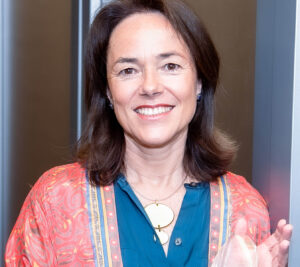Carola Vinuesa, MD, PhD, Honored with Lupus Insight Prize
 In June 2023 at the 23rd Annual Meeting of the Federation of Clinical Immunology Societies (FOCIS), Carola Vinuesa, MD, PhD, a Royal Society Wolfson fellow and assistant research director at the Francis Crick Institute, London, was awarded the Lupus Research Alliance’s Lupus Insight Prize. The $100,000 prize recognized her discovery of a genetic cause of lupus, thus paving the way for the development of novel treatments for those who have the disease.
In June 2023 at the 23rd Annual Meeting of the Federation of Clinical Immunology Societies (FOCIS), Carola Vinuesa, MD, PhD, a Royal Society Wolfson fellow and assistant research director at the Francis Crick Institute, London, was awarded the Lupus Research Alliance’s Lupus Insight Prize. The $100,000 prize recognized her discovery of a genetic cause of lupus, thus paving the way for the development of novel treatments for those who have the disease.
Dr. Vinuesa’s team used an uncommon approach to identify a novel disease-causing variant. “The classic approach has been to look for common variants in large populations of patients—genome-wide association studies (GWAS),” she said. They posited that sequencing the genome of a 7-yearold girl who presented with severe lupus—and whose parents did not have the variant—might lead to discovery of a monogenic pathway. And indeed, said Dr. Vinuesa, proceeding directly to putting this variant into a mouse model revealed that the TLR7 gene mutation did cause lupus in the mouse model. These findings (“TLR7 gain-of-function genetic variant causes human lupus”) were published in Nature in April 2022.
Dr. Vinuesa’s work at the Crick Institute focuses on using new tools, including novel mouse lines, to specifically explore questions aimed at the origin of autoantibodies and B cell tolerance. Simultaneously, her team is “trying to understand in depth the additional modifiers that contribute to the disease’s heterogeneity.
“We call lupus a prototypic system autoimmune disease, so I think that some of these discoveries will be relevant for other systemic autoimmune diseases, such as dermatomyositis, systemic sclerosis and perhaps Sjögren’s and others,” she says.
Dr. Vinuesa’s path to her current post began with an early passion to pursue medicine to help those in need. “I felt torn between science and medicine,” she recalls, and went into medicine with the idea of working with nongovernmental organizations, such as Médecins Sans Frontières (Doctors Without Borders). She obtained her medical degree at the University Autonoma of Madrid in 1993 and moved to the U.K. to complete her internships with the National Health Service. She then realized that she would be better suited to contribute via research, so she began her doctoral work in immunology, training with Ian MacLennan, emeritus professor of immunology at the University of Birmingham, and completed her doctorate in 2000. As a Wellcome Trust International Traveling Prize Research fellow, she also did postdoctoral work at the Australian National University (ANU), followed by a professorship in immunology at the ANU in 2010. She co-established and co-directed the NHMRC Centre of Research Excellence in Personalised Immunology, a position she held from 2014 to 2021, and joined the Crick Institute in September 2021.



